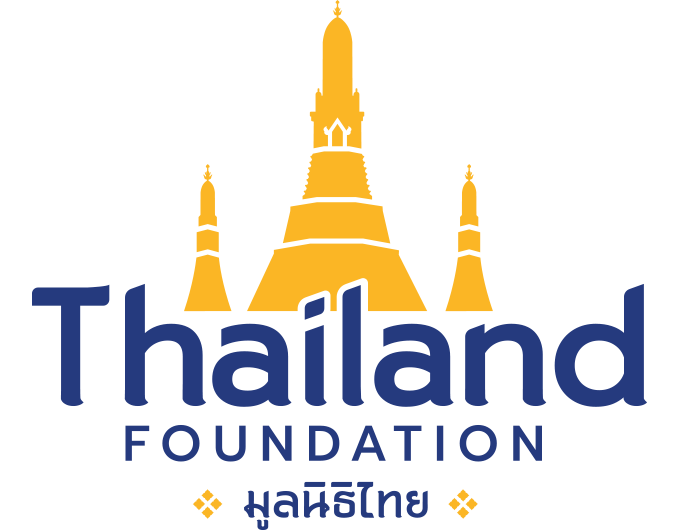Phuket Vegetarian Festival
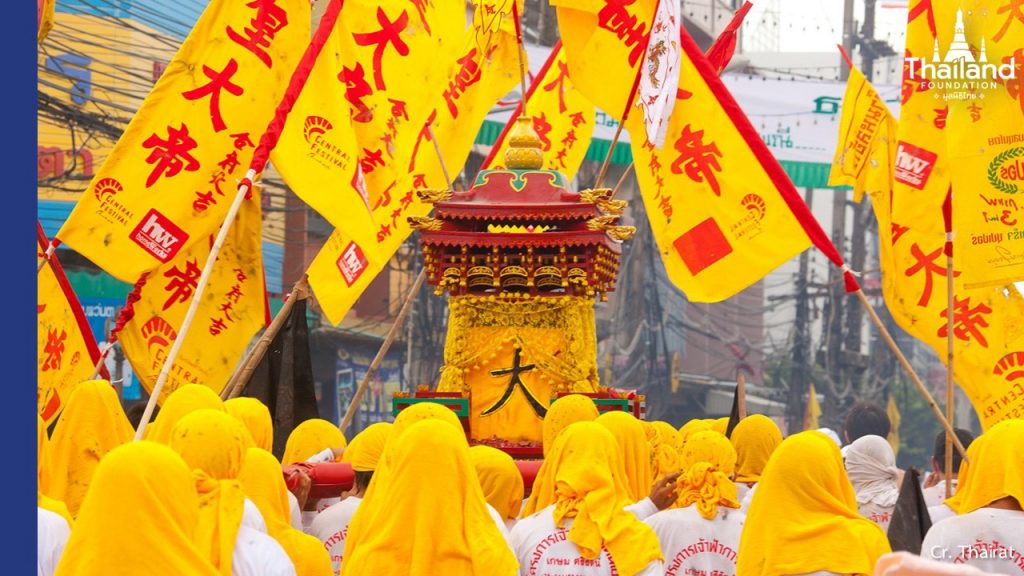
In the second half of the year, from late September to early October, the Thai-Chinese communities will observe a 9-day Chinese tradition called the Vegetarian Festival as known as Kin Jay (กินเจ) in Thai when they worship ancestors and deities by refraining from consuming meat and killing lives. Streets and building are decorated with yellow banners and flags and people are dressed in all white to cleanse themselves of temptations, ready to practice good deeds. This tradition is popular across Thailand mainly because of the Thai-Chinese beliefs but also partially because of the heavenly delectable Thai and Chinese vegetarian cuisine that attracts people of all beliefs to enjoy the food and spare lives.
What is Phuket Vegetarian Festival?
Even though this tradition is observed nationwide, the festival in Phuket is one of the most famous thanks to its ecstatic and extreme nature. Aside from the vegetarian cuisine, the parade is another highlight that everyone is looking forward to, especially the mediums called Ma Songs (ม้าทรง) who will give thrilling performances to the attendees. In order to cleanse the body and mind, those attending the Vegetarian Festival also observe various practices, including keeping their bodies clean, cleaning kitchen utensils and not sharing them with non-vegetarians, wearing white, behaving well physically and mentally, abstaining from sexual intercourses and alcohol.
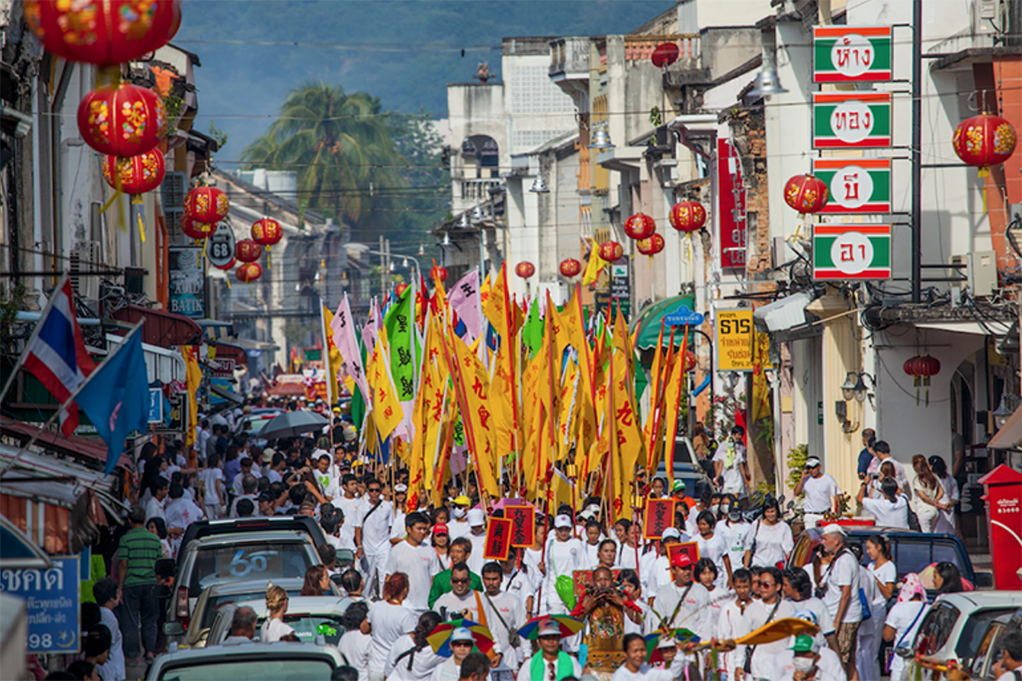
(Photo Credit: amazingthaitour)
History
According to legends, the vegetables eating tradition (Jia Chai) is a Taoist ritual that has long been observed every year by the Chinese. This ritual entered Thailand with Chinese immigrants who sought economic betterment in Phuket. The largest influx of immigrants occurred in 1825 when Thailand was trading tin with the West. Later, a troupe of Jingxi or Chinese opera visited the city of Phuket and organized performances. Thanks to the thriving economy of Phuket, the troupe was able to earn incomes all year round. However, members of the troupe started to fall ill. The troupe realized that they had not practiced the vegetables eating tradition that they did every year China, and therefore, summoned deities to the Jingxi theater and resumed the vegetarian tradition, which lasted nine days each year.
After practicing Jia Chai for a few years, diseases and ailments that the Jingxi troupe members had been experiencing, including the plagues that affected the people of Phuket started to subside and eventually disappeared. This event surprised many locals, both Chinese and Thai, prompting them to practice the vegetarian tradition like the Jingxi troupe did.
According to the troupe, summoning deities to worship at home was a noble idea to protect themselves, families and the hometown, but it would be even better if they could also follow religious precepts. Since it is not obligatory to practice vegetables eating for the whole nine days. Instead, participants can practice it as many days as desired depending on one’s faith and conditions. Some people pledge to practice vegetables eating for the entire life while some choose to do so only one day a year. It is the intention that counts, not the number of days. Until now, the Vegetarian Festival of Phuket has been carried on annually for hundreds of years, becoming a core identity of Phuket.
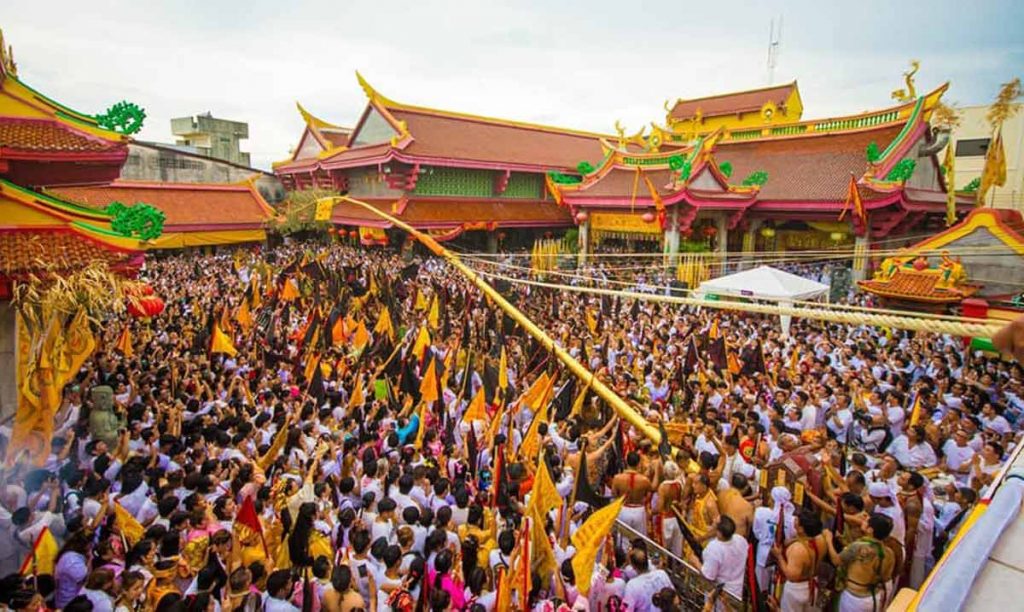
(Photo Credit: thairestaurantphuket)
Activities
- Cleaning
Before the festival, people will clean their shrines, houses, and kitchens.
- Setting up the shrine
Before 17:00, people will hear the sound of gongs telling them that it is time to erect the poles for the festival’s shrine. People will help pull the ropes tied to the poles to make the shrine stand up right. The ropes will later serve to transport the nine important lanterns to the top of the poles. Households or business establishments that worship deities will light three incense sticks to summon those deities to the Vegetarian Festival. At 23:00, scented sticks will be lit up to smoke the festival’s shrine, the kitchen, the residence of deities, and the shrine ground.
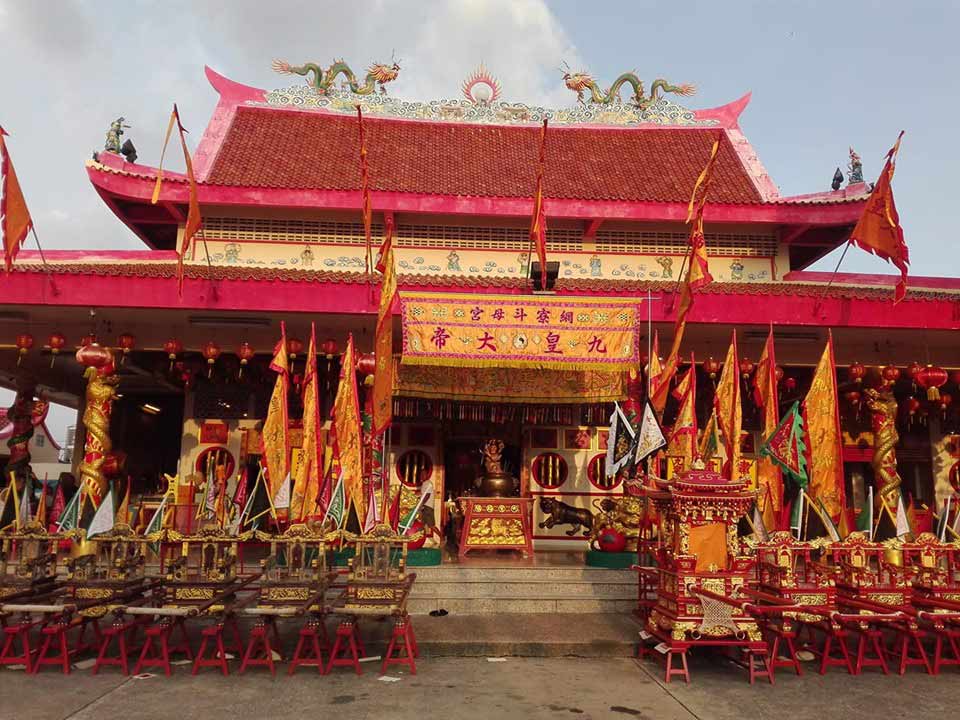
(Photo Credit: thairestaurantphuket)
- Summoning Lord Shiva and the Nine Emperors
At 12:15 on the first day of waxing moon (according to the Chinese lunar calendar), a ceremony is performed to summon Ong Song Tae, a Chinese deity who the locals synchronized with Lord Shiva of the Hindu faith, to preside over the vegetables eating ritual. The next step is to light the nine lanterns to summon the Nine Emperors, who preside over nine stars. The lanterns will first be pulled up to the half of the shrine’s poles. Next, the incense burner and a fragrance pot will be brought into the shrine, signaling that the deities have already entered their residence. Then, the lanterns will be pulled up to the top of the poles. This marks the start of the Vegetarian Festival.
- Pinto Day
The shrine’s kitchen will prepare food for people who will usually bring their own containers to receive the food. Today, the containers can be anything, but in the past, a popular container among Thais was pinto (ปิ่นโต), which is composed of multiple bowls of the same size stacked on top of each other and held together with a frame. In other words, a pinto is a multiple-piece food container. Before enjoying the food brought back home, people have to light incense sticks to worship their house deities and to smoke and cleanse the pintos.
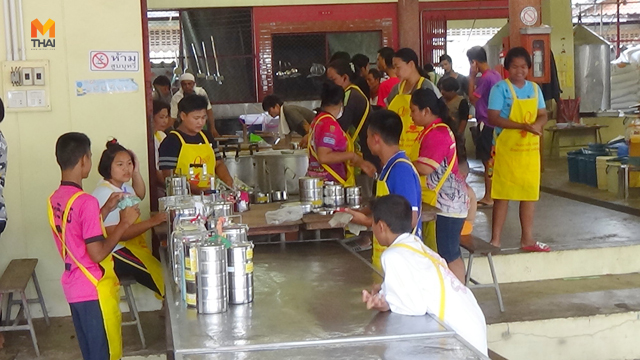
(Photo Credit: MThai)
- Marking the divine territory
The divine territory marking ceremony will be performed after three days into the festival. Pieces of bamboo wood with a name of a deity written on each of them will be planted on the ground around the shrine in five directions to summon divine armies as follows:
- In the east, a green flag is planted for the Green Flag General and 99,000 soldiers.
- In the south, a red flag is planted for the Red Flag General and 88,000 soldiers.
- In the west, a white flag is planted for the White Flag General and 66,000 soldiers.
- In the north, a black flag is planted for the Black Flag General and 55,000 soldiers.
- In the center, a yellow flag is planted for the Yellow Flag General and 33,000 soldiers.
After the territory marking is completed, a feast for the divine soldiers will take place every day for the rest of the festival.
- Summoning the holder of the birth and death account
The ceremony of summoning the birth and death account holder takes place on the same day at 19:30. The deity who holds the account of birth and death is summoned to reside in the shrine. After that, the name list of the Vegetarian Festival’s attendees will be revealed. A selection ceremony will be performed in front of Lord Shiva to recruit the festival’s committee members for the next year.
- Worshipping the planets’ deities
The worship of the planets’ deities includes other gods and goddesses as well. The activity consists of reciting prayers, reading the list of the festival participants and the amount of rice used at the festival so far, and praying for the participants to lead a healthy and happy life and for the vegetarian tradition to remain for a long time. Lastly, pieces of holy paper or cloth, called yant (ยันต์) or hoo (ฮู้) will be thrown from a high platform for people to collect.
- Lighting incense sticks from China
The heart of this ceremony is the march to the stone bridge. The march or the parade must consist of the following elements in the following order: a lead gong, a large flag, a lead flag, a name plate of the Nine Emperors, a long oboe (pi yao – ปี่ยาว), a big gong, a small carriage, Ma Songs, a holy flute, a fragrance pot, an umbrella and a hand-held incense burner, and a large carriage.
- Warding off bad luck
The ceremony to ward off bad luck is performed by mediums called Ma Songs who will walk through fire to burn away misfortune. Another ceremony is for ordinary people who cannot walk through fire. For men, they have to hold a piece of paper cut in the shape of a person with his name and date of birth written on it, a festive tree, and some coins. They then walk over the fragrance pot to meet Ma Songs who will ward off evil, then cross the bridge, and have the paper stamped with the divine seal. Women follow the same steps except walking over the fragrance pot.
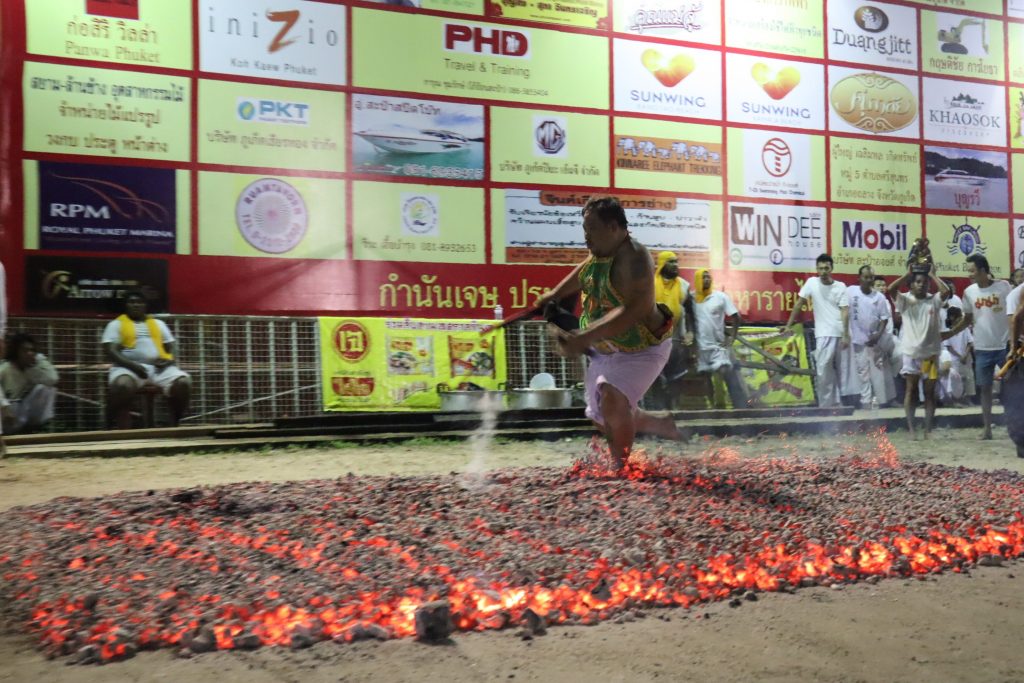
(Photo Credit: Khao Sod)
- Seeing off Lord Shiva and the Nine Emperors as they return to heaven
After nine days and nights of the ceremony, we bid farewell to the deities summoned to preside and watch over the Vegetarian Festival. In front of the festival’s shrine, the number of the festival attendees and the amount of rice used will be summarized and announced. Everyone prays for the shrines in the communities to remain for ten thousand years and that the people lead a prosperous life.
- Dismantling the festival shrine’s poles
On the last day of the vegetables eating ceremony, every shrine has to put a red sacred paper on every door and collect all of their utensils used in the ceremony. The kitchen will prepare various savory dishes, including meat. At 17:00, people will come together to help dismantle the poles of the shrine, return the divine soldiers back to their army bases. They then enjoy the savory and meat dishes prepared by the kitchen together. This marks the end of the vegetables eating ceremony.
The Mediums called Ma Song (ม้าทรง)
A group of people who deserve to be another main event of the ceremony is the mediums called “Ma Songs” or the “horses of the gods”. They serve as figures for the gods, transmitting their energy either to ward off or to absorb misfortune for those who practice vegetables eating. Ma Songs can be male or female. When the gods are summoned into their bodies, they will use various kinds of sharp weapons or objects to pierce their cheeks, tongue, arms, chest, or back. These bodily tortures are seen as means of salvation for Ma Songs themselves and all festival participants.
Ma Songs are not just anybody but must be chosen by the gods. Selection is a matter of fate. For example, the gods may have mercy on a person whose life is plagued with misfortunes or is destined to meet his end in the very near future. As he travels to a shrine to make merit, the gods may choose that person as a Ma Song to give him another opportunity to live for other fellow human beings and create good deeds. Having a physique ideal for a Ma Song or being born in a family of Ma Song can be an enabling factor in the selection. Ma Song is a lifelong commitment. The selected person must behave according to the gods’ wishes so that they stay with him for the rest of his life. A misconduct may result in the deities leaving his body during the ceremonial performances and ultimately death. On the contrary, if Ma Song behaves and fully devotes his body to the deities, he will be blessed with a successful life.
The acts of self-torture performed by Ma Songs, including stabbing body parts with a sharp object, walking through fire, or climbing a knife ladder is unquestionably terrifying, but to Ma Songs, they claim to feel nothing at all because their bodies no longer belong to them but to the gods. They say that the whole performance feels like a dream. At the end of the ceremony, they treat the wounds with the ashes from the incense sticks and put a holy paper or yant on it.
Regardless of our views on Ma Songs and their beliefs, the undeniable point is they have proven their compassion, devotion, and strong faith in gods and community service.
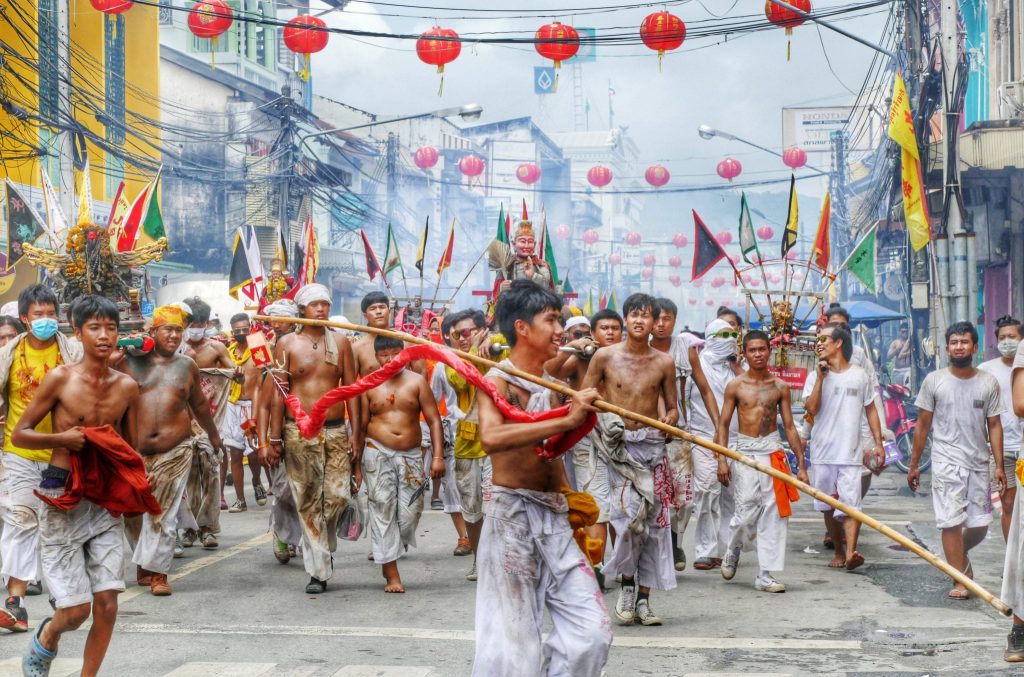
(Photo Credit: ShopBack)
Values
The Vegetarian Festival perfectly reflects the three fundamental values of the Thai society. The first one is respect. In this case, the value extends to the gods of the Chinese Taoism and Hinduism as in Lord Shiva who, people believe, will protect them from misfortune. For the Thai Chinese, it is the respect for their ancestral cultures and beliefs. In Thailand, the vegetarian festival has been practiced for over four centuries, but this is only a continuation of the tradition that dates back far longer in China.
Secondly, it reflects the compassion that the Thai people have for one another, including other living beings. In Thailand, there is a slogan for this festival that says “One life practices vegetarianism, ten thousand lives are spared.” (หนึ่งชีวิตกินเจ หมื่นชีวิตรอดตาย) This is the essence of the festival that goes beyond wishing for one’s own life to be happy, fortunate, and prosperous, but also to give life to other animals. And what we must not forget is the sacrifice of Ma Songs who bear the lifelong responsibility of serving the gods and their communities.
Finally, this ritual reflects the openness of the Thai society, which welcomes Chinese immigrants who coexist in such as perfect harmony that even the Chinese cultural element has now been integrated into the local identity.
Sources
- https://travel.trueid.net/detail/bgGJwDE5D3d9
- https://www.phuketvegetarian.com/
- https://www.youtube.com/watch?v=T97wlS-CwsA
- https://www.youtube.com/watch?v=fNgG23lTXB4
__________________________________________________________________________________________
Author: Soonyata Mianlamai
26 September 2022
